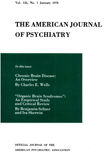The Seemingly Ubiquitous Depression Following Acute Schizophrenic Episodes, A Neglected Area of Clinical Discussion
Abstract
When the treatment of an acute schizophrenic episode is considered, prime emphasis is usually placed on the acute psychotic state as the major occurrence. The author stresses the need to focus also on what he calls the "compensated-transition" phase and the "depressive-neurasthenic" phase, which follow. The importance of treating these latter phases effectively, preferably by the same physician who treated the acute stage, should be given more attention in residency training programs, he believes.
Access content
To read the fulltext, please use one of the options below to sign in or purchase access.- Personal login
- Institutional Login
- Sign in via OpenAthens
- Register for access
-
Please login/register if you wish to pair your device and check access availability.
Not a subscriber?
PsychiatryOnline subscription options offer access to the DSM-5 library, books, journals, CME, and patient resources. This all-in-one virtual library provides psychiatrists and mental health professionals with key resources for diagnosis, treatment, research, and professional development.
Need more help? PsychiatryOnline Customer Service may be reached by emailing [email protected] or by calling 800-368-5777 (in the U.S.) or 703-907-7322 (outside the U.S.).



